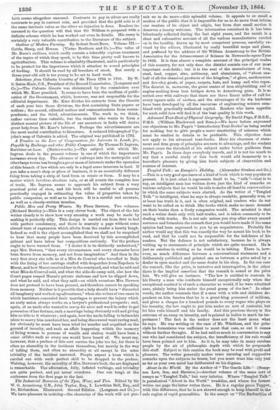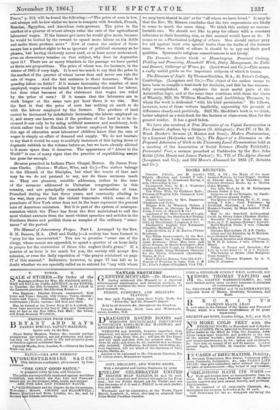About in the World. By the Author of "The Gentle
Life." (Samp- son Low, Son, and Marston.)—Another volume of the same sort of essays as "Tangled Talk," but very inferior. Where "Tangled Talk" is paradoxical "About in the World" twaddles, and where the former writes one page the latter writes three. He is a regular prose Tupper, with this difference, that he is not shrewd enough to keep himself in/the safe region of vapid generalities. In the essays on "The Barbaritps of Peace," p. 212, will be found the following:—" The price of corn is low, and always will be low whilst we have to compete with Swedish, French, Russian, Egyptian, and American corn-growers. The price in the market of a quarter of wheat always rules the rate of the agricultural labourers' wages. If the farmer got more he would give more, because he would be incited by the reward to spend more labour on his fields and make them produce more " Now of course the author of these essays has a perfect right to be as ignorant of political enonomy as he pleases, but having obviously never read, or at least never understood, even an elementary treatise on that subject, why does he dogmatize upon it ? There are as many blunders in the passage we have quoted as there are propositions. The price of wheat was, for instance, in the 'winter of 1861-2 very high. It is not too much to say that the price in the market of the quarter of wheat never does and never can rule the rate of wages. And the last sentence is sheer nonsense. What is spending labour on fields? If it means increasing the number of men employed, wages would be raised by the increased demand for labour, but then what becomes of the statement that wages are ruled by the price of corn? If it means that the labourers are to work longer at the same rate per hour there is no rise. But the fact is that the price of corn has nothing on earth to do with the labour employed by the farmer. The produce of land cannot be increased by indefinitely increasing the labour employed on it, and every one knows that if the produce of the land is to be in- creased it can only be by using artificial manures and machinery, both which rather tend to diminish the labour employed by farmers. In this age of education most labourers' children know that the rate of wages is simply an affair of demand and supply. We do not hesitate to say that it would be easy to multiply instances of this laying down of dogmatic rubbish in the volume before us, but we have already allotted to it more space than it deserves. The appearance of "About in the World" is one of many signs that the practice of republishing essays has gone far enough.































 Previous page
Previous page